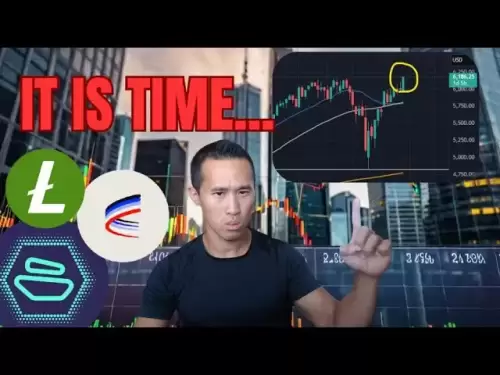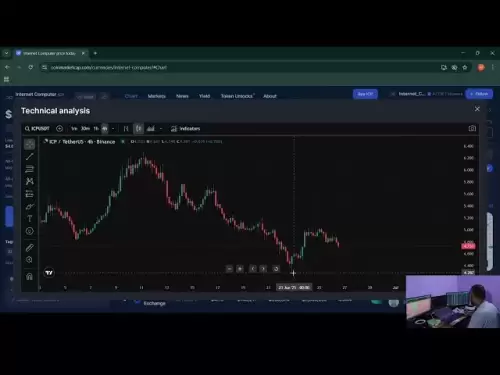-
 Bitcoin
Bitcoin $107,247.2038
-0.18% -
 Ethereum
Ethereum $2,424.7947
0.34% -
 Tether USDt
Tether USDt $1.0003
-0.02% -
 XRP
XRP $2.1171
-3.33% -
 BNB
BNB $645.6618
0.06% -
 Solana
Solana $141.5898
-1.32% -
 USDC
USDC $0.9998
0.00% -
 TRON
TRON $0.2710
-0.41% -
 Dogecoin
Dogecoin $0.1602
-2.99% -
 Cardano
Cardano $0.5553
-2.28% -
 Hyperliquid
Hyperliquid $36.3019
-2.42% -
 Bitcoin Cash
Bitcoin Cash $491.7212
2.04% -
 Chainlink
Chainlink $13.0810
-0.23% -
 Sui
Sui $2.6080
-5.06% -
 UNUS SED LEO
UNUS SED LEO $9.0040
-0.05% -
 Stellar
Stellar $0.2350
-3.06% -
 Avalanche
Avalanche $17.2294
-2.31% -
 Toncoin
Toncoin $2.8075
-1.05% -
 Shiba Inu
Shiba Inu $0.0...01121
-3.43% -
 Litecoin
Litecoin $84.2215
-0.32% -
 Hedera
Hedera $0.1429
-4.88% -
 Monero
Monero $312.2199
-0.90% -
 Dai
Dai $0.9997
-0.01% -
 Ethena USDe
Ethena USDe $0.9999
-0.02% -
 Polkadot
Polkadot $3.2973
-2.60% -
 Bitget Token
Bitget Token $4.4742
3.12% -
 Pi
Pi $0.5631
-10.10% -
 Uniswap
Uniswap $6.7817
-2.06% -
 Pepe
Pepe $0.0...09252
-3.74% -
 Aave
Aave $251.3830
-2.24%
How to exchange ETH at a low price through DEX?
To get the best ETH price on DEXs, monitor multiple platforms, consider liquidity and volume, and use tools to compare prices across exchanges.
Mar 28, 2025 at 03:57 am

Understanding Decentralized Exchanges (DEXs) and ETH Trading
Decentralized exchanges (DEXs) offer a compelling alternative to centralized exchanges (CEXs) for trading Ethereum (ETH). Unlike CEXs, DEXs don't hold your funds. Instead, you retain custody of your crypto assets throughout the entire trading process. This enhanced security is a major draw for many users. However, navigating the world of DEXs to achieve the best price for your ETH requires understanding their mechanics and various features.
Finding the Best ETH Price Across DEXs
Finding the lowest price for ETH across different DEXs requires a multi-pronged approach. No single DEX consistently offers the absolute best price. Liquidity plays a crucial role. Higher liquidity generally means tighter spreads (the difference between the bid and ask price), resulting in a more favorable exchange rate. Trading volume is also a key indicator of liquidity. DEXs with high trading volume tend to offer better prices due to increased competition among traders.
You should actively monitor multiple DEXs simultaneously. Websites and applications offering aggregated DEX data can significantly simplify this process. These tools display the current ETH price across various platforms, allowing you to quickly identify the most attractive offer. Remember that prices fluctuate constantly, so you need to act swiftly once you've found a desirable price.
Understanding DEX Trading Fees and Slippage
DEXs typically charge fees in the form of gas fees (transaction fees on the Ethereum blockchain) and trading fees (a percentage of the trade value). Gas fees are highly variable and depend on network congestion. High network activity leads to higher gas fees, potentially offsetting any price advantage gained by trading on a DEX. Therefore, timing your trades strategically to coincide with periods of lower network activity is crucial for minimizing overall costs.
Slippage is another factor influencing the final price you receive. Slippage occurs when the actual price at which your trade executes differs from the price you initially saw. This is more likely to happen during periods of high volatility or low liquidity. Large trades are particularly susceptible to slippage. Using limit orders instead of market orders can help mitigate slippage. A limit order lets you specify the maximum price you're willing to pay or the minimum price you're willing to receive, ensuring you don't overpay or undersell.
Step-by-Step Guide to Trading ETH on a DEX
Choose a DEX: Research and select a reputable DEX that supports ETH trading and offers competitive fees and liquidity. Popular choices include Uniswap, SushiSwap, and Curve. Consider factors like user interface, security, and available features.
Connect your wallet: You'll need a compatible cryptocurrency wallet (e.g., MetaMask, Trust Wallet) to interact with the DEX. Ensure your wallet is properly configured and has sufficient ETH or other tokens for gas fees.
Add liquidity (optional): Adding liquidity to a DEX's trading pool can earn you trading fees. This is a more advanced strategy, and you need to understand the risks involved before committing your funds.
Place your order: Decide whether to use a market order (executes immediately at the current market price) or a limit order (executes only when the price reaches your specified level). Carefully review the details of your order before confirming.
Confirm the transaction: Your wallet will prompt you to confirm the transaction. Review the gas fees and ensure you're comfortable with the cost before proceeding.
Monitor your trade: Once the transaction is confirmed on the blockchain, you can monitor its status on the DEX. It might take some time for the trade to fully settle, depending on network conditions.
Utilizing Advanced Trading Strategies on DEXs
Experienced traders can employ more sophisticated strategies to potentially improve their ETH acquisition price. Arbitrage involves exploiting price differences between different DEXs or exchanges. This requires quick execution and can be quite complex. Yield farming involves providing liquidity to decentralized finance (DeFi) protocols in exchange for rewards, potentially increasing your ETH holdings over time. Both strategies require a deep understanding of market dynamics and carry inherent risks.
Security Best Practices When Trading ETH on DEXs
Always prioritize security when trading on DEXs. Only use reputable DEXs with a proven track record. Double-check all transaction details before confirming them to avoid errors or scams. Keep your wallet secure by using strong passwords and enabling two-factor authentication. Never share your private keys or seed phrases with anyone. Be wary of phishing scams and fraudulent websites. Regularly update your wallet software and keep informed about the latest security best practices.
Frequently Asked Questions
Q: What are the advantages of using DEXs over CEXs for ETH trading?
A: DEXs offer greater security due to decentralized nature and user control over funds. They also provide more anonymity and avoid KYC/AML regulations. However, they might have lower liquidity than CEXs and can involve higher gas fees.
Q: How can I minimize gas fees when trading ETH on a DEX?
A: Trade during periods of low network congestion, consider using cheaper transaction methods offered by some DEXs, and batch transactions where possible.
Q: What is slippage, and how can I reduce it?
A: Slippage is the difference between the expected and actual trade price. Use limit orders, avoid large trades during volatile periods, and choose DEXs with high liquidity to minimize slippage.
Q: Are DEXs safe?
A: Reputable DEXs are generally safe, but users must exercise caution. Use strong security practices, only interact with verified contracts, and be aware of potential scams.
Q: What are some popular DEXs for trading ETH?
A: Popular DEXs include Uniswap, SushiSwap, Curve, and QuickSwap. Each has its strengths and weaknesses; research before choosing.
Q: How do I choose the right DEX for my needs?
A: Consider factors such as trading fees, liquidity, user interface, supported tokens, and security reputation when selecting a DEX.
Q: Can I lose money trading ETH on a DEX?
A: Yes, the cryptocurrency market is inherently volatile, and you can lose money trading ETH on a DEX. Thorough research and risk management are essential.
Disclaimer:info@kdj.com
The information provided is not trading advice. kdj.com does not assume any responsibility for any investments made based on the information provided in this article. Cryptocurrencies are highly volatile and it is highly recommended that you invest with caution after thorough research!
If you believe that the content used on this website infringes your copyright, please contact us immediately (info@kdj.com) and we will delete it promptly.
- MAGACOIN, Ethereum, and Dogecoin: Navigating the Crypto Landscape in 2025
- 2025-06-27 08:50:12
- Shiba Inu, Portfolio, and Cryptocurrency: Navigating the Meme Coin Mania in 2025
- 2025-06-27 08:30:12
- Quantum Threat, Bitcoin Encryption, Experts Warn: Is Your BTC Safe?
- 2025-06-27 08:50:12
- Wall Street Pepe (WEPE) Price Up: The Meme Coin Making Waves on Wall Street
- 2025-06-27 08:50:13
- Bitcoin Rises as Altcoins Slump: A New Era for Crypto?
- 2025-06-27 08:50:13
- Dogecoin's Wild Ride: Support Levels and Open Interest Under the Microscope
- 2025-06-27 08:55:12
Related knowledge

How to customize USDT TRC20 mining fees? Flexible adjustment tutorial
Jun 13,2025 at 01:42am
Understanding USDT TRC20 Mining FeesMining fees on the TRON (TRC20) network are essential for processing transactions. Unlike Bitcoin or Ethereum, where miners directly validate transactions, TRON uses a delegated proof-of-stake (DPoS) mechanism. However, users still need to pay bandwidth and energy fees, which are collectively referred to as 'mining fe...

USDT TRC20 transaction is stuck? Solution summary
Jun 14,2025 at 11:15pm
Understanding USDT TRC20 TransactionsWhen users mention that a USDT TRC20 transaction is stuck, they typically refer to a situation where the transfer of Tether (USDT) on the TRON blockchain has not been confirmed for an extended period. This issue may arise due to various reasons such as network congestion, insufficient transaction fees, or wallet-rela...

How to cancel USDT TRC20 unconfirmed transactions? Operation guide
Jun 13,2025 at 11:01pm
Understanding USDT TRC20 Unconfirmed TransactionsWhen dealing with USDT TRC20 transactions, it’s crucial to understand what an unconfirmed transaction means. An unconfirmed transaction is one that has been broadcasted to the blockchain network but hasn’t yet been included in a block. This typically occurs due to low transaction fees or network congestio...

How to check USDT TRC20 balance? Introduction to multiple query methods
Jun 21,2025 at 02:42am
Understanding USDT TRC20 and Its ImportanceUSDT (Tether) is one of the most widely used stablecoins in the cryptocurrency market. It exists on multiple blockchain networks, including TRC20, which operates on the Tron (TRX) network. Checking your USDT TRC20 balance accurately is crucial for users who hold or transact with this asset. Whether you're sendi...

What to do if USDT TRC20 transfers are congested? Speed up trading skills
Jun 13,2025 at 09:56am
Understanding USDT TRC20 Transfer CongestionWhen transferring USDT TRC20, users may occasionally experience delays or congestion. This typically occurs due to network overload on the TRON blockchain, which hosts the TRC20 version of Tether. Unlike the ERC20 variant (which runs on Ethereum), TRC20 transactions are generally faster and cheaper, but during...

The relationship between USDT TRC20 and TRON chain: technical background analysis
Jun 12,2025 at 01:28pm
What is USDT TRC20?USDT TRC20 refers to the Tether (USDT) token issued on the TRON blockchain using the TRC-20 standard. Unlike the more commonly known ERC-20 version of USDT (which runs on Ethereum), the TRC-20 variant leverages the TRON network's infrastructure for faster and cheaper transactions. The emergence of this version came as part of Tether’s...

How to customize USDT TRC20 mining fees? Flexible adjustment tutorial
Jun 13,2025 at 01:42am
Understanding USDT TRC20 Mining FeesMining fees on the TRON (TRC20) network are essential for processing transactions. Unlike Bitcoin or Ethereum, where miners directly validate transactions, TRON uses a delegated proof-of-stake (DPoS) mechanism. However, users still need to pay bandwidth and energy fees, which are collectively referred to as 'mining fe...

USDT TRC20 transaction is stuck? Solution summary
Jun 14,2025 at 11:15pm
Understanding USDT TRC20 TransactionsWhen users mention that a USDT TRC20 transaction is stuck, they typically refer to a situation where the transfer of Tether (USDT) on the TRON blockchain has not been confirmed for an extended period. This issue may arise due to various reasons such as network congestion, insufficient transaction fees, or wallet-rela...

How to cancel USDT TRC20 unconfirmed transactions? Operation guide
Jun 13,2025 at 11:01pm
Understanding USDT TRC20 Unconfirmed TransactionsWhen dealing with USDT TRC20 transactions, it’s crucial to understand what an unconfirmed transaction means. An unconfirmed transaction is one that has been broadcasted to the blockchain network but hasn’t yet been included in a block. This typically occurs due to low transaction fees or network congestio...

How to check USDT TRC20 balance? Introduction to multiple query methods
Jun 21,2025 at 02:42am
Understanding USDT TRC20 and Its ImportanceUSDT (Tether) is one of the most widely used stablecoins in the cryptocurrency market. It exists on multiple blockchain networks, including TRC20, which operates on the Tron (TRX) network. Checking your USDT TRC20 balance accurately is crucial for users who hold or transact with this asset. Whether you're sendi...

What to do if USDT TRC20 transfers are congested? Speed up trading skills
Jun 13,2025 at 09:56am
Understanding USDT TRC20 Transfer CongestionWhen transferring USDT TRC20, users may occasionally experience delays or congestion. This typically occurs due to network overload on the TRON blockchain, which hosts the TRC20 version of Tether. Unlike the ERC20 variant (which runs on Ethereum), TRC20 transactions are generally faster and cheaper, but during...

The relationship between USDT TRC20 and TRON chain: technical background analysis
Jun 12,2025 at 01:28pm
What is USDT TRC20?USDT TRC20 refers to the Tether (USDT) token issued on the TRON blockchain using the TRC-20 standard. Unlike the more commonly known ERC-20 version of USDT (which runs on Ethereum), the TRC-20 variant leverages the TRON network's infrastructure for faster and cheaper transactions. The emergence of this version came as part of Tether’s...
See all articles
























































































